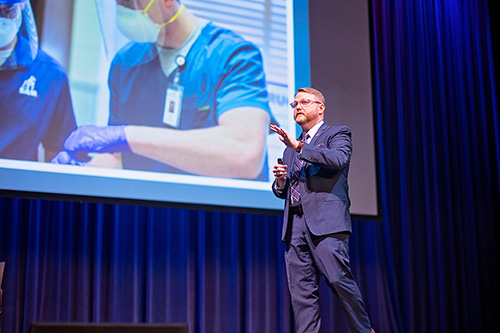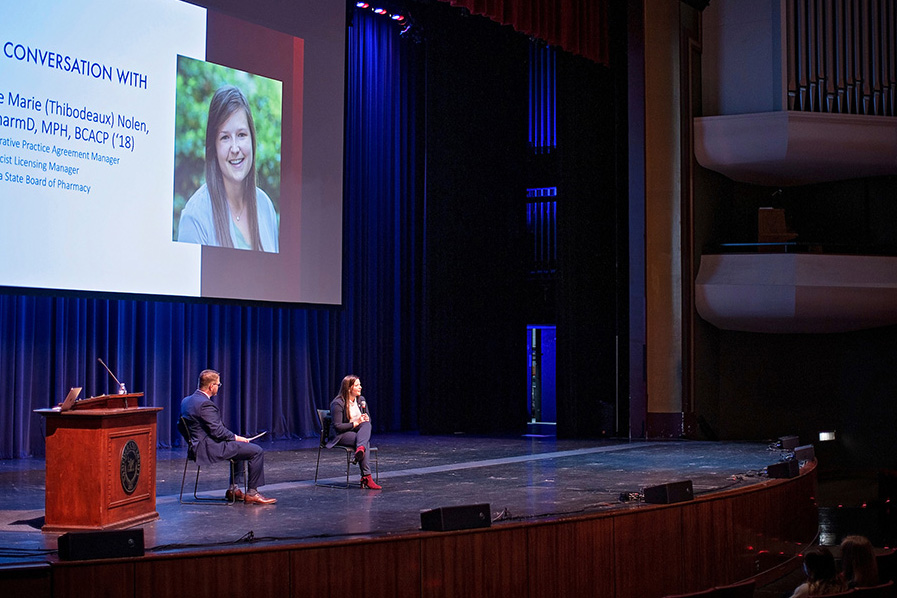
“The state of the school is strong,” said Michael Crouch, dean of Samford University’s McWhorter School of Pharmacy at his annual address on January 7. “It is strong because of your resilience; it is strong because of the people you are; and, it is strong because of the advocacy we’ll pursue this year on behalf of the patients we serve.”
First held in 2015, the dean’s annual State of the School Address is designed to be a time that reflects on the accomplishments of the past year and shares a vision for the year to come. Since the 2021 address was canceled because of COVID, Crouch took the opportunity to reflect on the past two years, applauding the leadership role the school played in caring for the Samford community.
“We can’t ignore the challenges faced by the school, university, and country related to the ongoing pandemic. But while skeptics may say we’ve been in a holding pattern for the past two years, I say Samford University and McWhorter School of Pharmacy have led and adapted well during this challenging time,” he said.
In his remarks, Crouch shared numerous examples that highlighted the school’s resilience, including the ways students and faculty served through COVID-19 testing as well as administering vaccines on Samford’s campus and in the community. And, as highlighted in the school’s annual report, he spoke to the personal success that students and faculty achieved through their leadership and ongoing research.
Additionally, Crouch dedicated much of his address to the advocacy role the school plays as it relates to the profession of pharmacy, especially as the Alabama Board of Pharmacy continues its work establishing collaborative practice within the state.
To speak more to this, Crouch invited alumna Anne Marie Nolen, Pharm.D. ’18, M.P.H. ’18, on stage for a questions-and-answers session. Nolen serves as the collaborative practice agreement manager and pharmacy licensing manager for the Alabama Board of Pharmacy.
Nolen first provided a laymen’s definition. “Collaborative practice is an agreement between a physician and a pharmacist that allows the pharmacist to do more advanced clinical tasks than they could do in a typical pharmacy setting,” she said.

Since the required legislation was passed in 2019, the Alabama Board of Pharmacy has been working with the Alabama Board of Medical Examiners to determine the specifics of how collaborative practice will be implemented. For Nolen, this work has made her optimistic for the future of pharmacy in the state. “I would argue that we have an incredible start for our legislation and the rules that we have drafted,” she said. “I have read collaborative practice laws in almost every state, and I can tell you that the workflow we have established is among the best.”
With the implementation of collaborative practice, the “sky is the limit,” she said, for the expanded role pharmacists could serve in caring for patients. Knowing this, she encouraged students to gain experience in as many pharmacy settings as they can, looking for ways that pharmacists can support the ongoing work of physicians and other providers, like chronic disease management.
“A goal of mine—with my ambulatory care experience—is to see more pharmacists in the primary care setting. There is a primary care physician shortage everywhere, but certainly in Alabama. Pharmacists can play a key role here,” she said.
As a third-generation pharmacist, Crouch has witnessed the evolution of pharmacy within his own family, seeing how his father and grandfather cared for their communities. “It’s amazing at how far we have come,” he said. “But students, I want to challenge you. The future of this profession is not determined by me or the faculty in this room. It is dependent on you. How will you advocate for change?”
